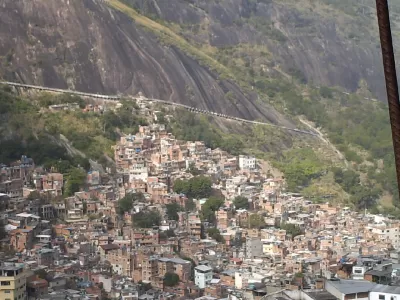The sky gondola system built prior to the Rio Olympics has ground to a halt, leaving residents of the city's favelas with little to show for such a grand investment in infrastructure.

The multi-million dollar sky gondola system built as part of the massive investment in new infrastructure for the 2016 Rio de Janeiro Olympic games has stopped operating. The project was originally seen as a boon to the favelas which it travelled over, bringing tourists and investment into the city's poorest communities. Clare Richardson reports in DW.comthat the gondolas fell victim to Brazil's continuing financial troubles.
Many had hoped the Olympic Games would serve as an impetus for Rio to narrow the vast divide between Brazil's ultra-rich and poor by providing informal communities with badly-needed infrastructure. Yet instead of instating or upgrading such services in Complexo do Alemao, Rio removed more than 2,000 residents from their homes to make way for the cable car's construction. [Local activist Thaina de Medeiros] says its route bypasses many major residential areas, suggesting the project was never truly intended to serve the community.
The closure of the gondola system is another blow to the favelas, which have seen an uptick in crime that has helped drive away tourists.
FULL STORY: Rio hits the brakes on controversial favela cable car

Alabama: Trump Terminates Settlements for Black Communities Harmed By Raw Sewage
Trump deemed the landmark civil rights agreement “illegal DEI and environmental justice policy.”

Study: Maui’s Plan to Convert Vacation Rentals to Long-Term Housing Could Cause Nearly $1 Billion Economic Loss
The plan would reduce visitor accommodation by 25% resulting in 1,900 jobs lost.

Why Should We Subsidize Public Transportation?
Many public transit agencies face financial stress due to rising costs, declining fare revenue, and declining subsidies. Transit advocates must provide a strong business case for increasing public transit funding.

Wind Energy on the Rise Despite Federal Policy Reversal
The Trump administration is revoking federal support for renewable energy, but demand for new projects continues unabated.

Passengers Flock to Caltrain After Electrification
The new electric trains are running faster and more reliably, leading to strong ridership growth on the Bay Area rail system.

Texas Churches Rally Behind ‘Yes in God’s Back Yard’ Legislation
Religious leaders want the state to reduce zoning regulations to streamline leasing church-owned land to housing developers.
Urban Design for Planners 1: Software Tools
This six-course series explores essential urban design concepts using open source software and equips planners with the tools they need to participate fully in the urban design process.
Planning for Universal Design
Learn the tools for implementing Universal Design in planning regulations.
Caltrans
Smith Gee Studio
Institute for Housing and Urban Development Studies (IHS)
City of Grandview
Harvard GSD Executive Education
Toledo-Lucas County Plan Commissions
Salt Lake City
NYU Wagner Graduate School of Public Service


























